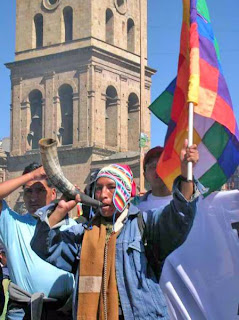Martin Arostegui
Bolivia wants greater role in key mining sector
Martin Arostegui
LA PAZ, Bolivia--The Bolivian government wants to increase its role in
the mining industry through state-run mining company Comibol and taxes
that promote onshore processing of the country's mineral wealth,
according to top officials.
"The state will participate at all levels of the mineral production
chain with a view to increase revenues and strengthen Comibol," Hector
Cordoba, the company's president, said at a mining conference in La Paz.
In 2009, Bolivia changed its constitution to require miners to form
joint ventures with the government mining company Comibol for all new
projects. Mr. Cordoba, a metallurgical engineer, said Bolivia needs to
focus on "industrializing" its mineral wealth.
Comibol plans to build five smelters for silver, gold, zinc and other
metals to process the ore in Bolivia, rather than shipping it abroad, he
said.
Bolivia's history is closely intertwined with mining. Silver mined from
the Cerro Rico mountain in Potosi generated fabulous wealth for the
Spanish crown during the colonial era. For much of the 20th century, tin
was king in Bolivia, with tin baron Simon Patino thought to be one of
the world's wealthiest tycoons at the time of his death in 1947.
Today, mining accounts for 6.3% of Bolivia's gross domestic product and
37% of exports. Mineral exports are the country's No. 2 source of hard
currency after natural gas. Bolivia's mining production was valued at $2
billion last year, up from just $430 million in 2005, while exports
grew almost fivefold during that period, according to Comibol.
Speaking at the same conference, Deputy Mining Minister Freddy Beltran
said Bolivia needs to find ways "to gain more government revenues from
mineral exports." Those measures might include higher taxes and creating
incentives for the production of value-added products from minerals, he
said.
Bolivia already levies some of the highest taxes on mining in Latin
America, said Humberto Rada, president of Coeur d'Alene Mines'
CDE
+1.18%
Coeur South America, at the conference.
Mining companies pay a 37% tax on their profits as well as royalties of between 5% and 7%, among other taxes, he said.
President Evo Morales is expected to sponsor legislation and issue
decrees in the next few months that will increase the state's role in
the sector.
Mr. Morales has already nationalized two privately-owned mines this
year. In July, he seized South American Silver Corp's (SOHAF, SAC.T)
Malku Khota mine after local communities invaded the mining site. The
previous month, the government took over Glencore International PLC's
(GLNCY, GLEN.LN, 0805.HK) Conliquiri zinc and tin mine.
Mr. Beltran said the government didn't have a "predetermined policy of nationalizations" in those cases.
South American Silver lost its mine because of the conflict with local
communities, while the government had been trying to renegotiate
Glencore's concession since 2006, he said.
Many foreign energy companies pulled up stakes following the
nationalization. But the Morales administration has started to actively
court foreign investors again, with YPFB hosting its second annual
energy conference this year.
Investment has started to return, enticed by government overtures and Bolivia's vast natural gas resources.
But the expropriation of foreign mining assets and the collapse of an
iron-and-steel joint venture between the government and India's Jindal
Steel & Power Ltd. haven't helped the investment climate. Mr.
Cordoba fears the government's latest nationalization binge might scare
away badly needed foreign investment.
"We have serious deficits in two key areas; technology and trained
personnel," he told The Wall Street Journal. "For this we need to
associate with foreign companies."
Mr. Cordoba also complained about what he described as the "excessive
influence" that local communities and mining cooperatives have over
mining projects.
Bolivia's 100,000 cooperative miners have gained significant sway over
the sector under the Morales administration. Those miners--together with
indigenous communities, who under the constitution are the owners of
the country's natural resources--have occupied several mines in Bolivia.
Mr. Cordoba said he wants to expel representatives of the powerful
national federation of cooperative miners, or Fencomin, from Comibol's
management due to "conflict of interests".
Mr. Beltran said that Fencomin and other grassroots sectors need to be included in the drafting of new mining legislation.
Republished from Marketwatch
Subscribe to:
Post Comments (Atom)




No comments:
Post a Comment